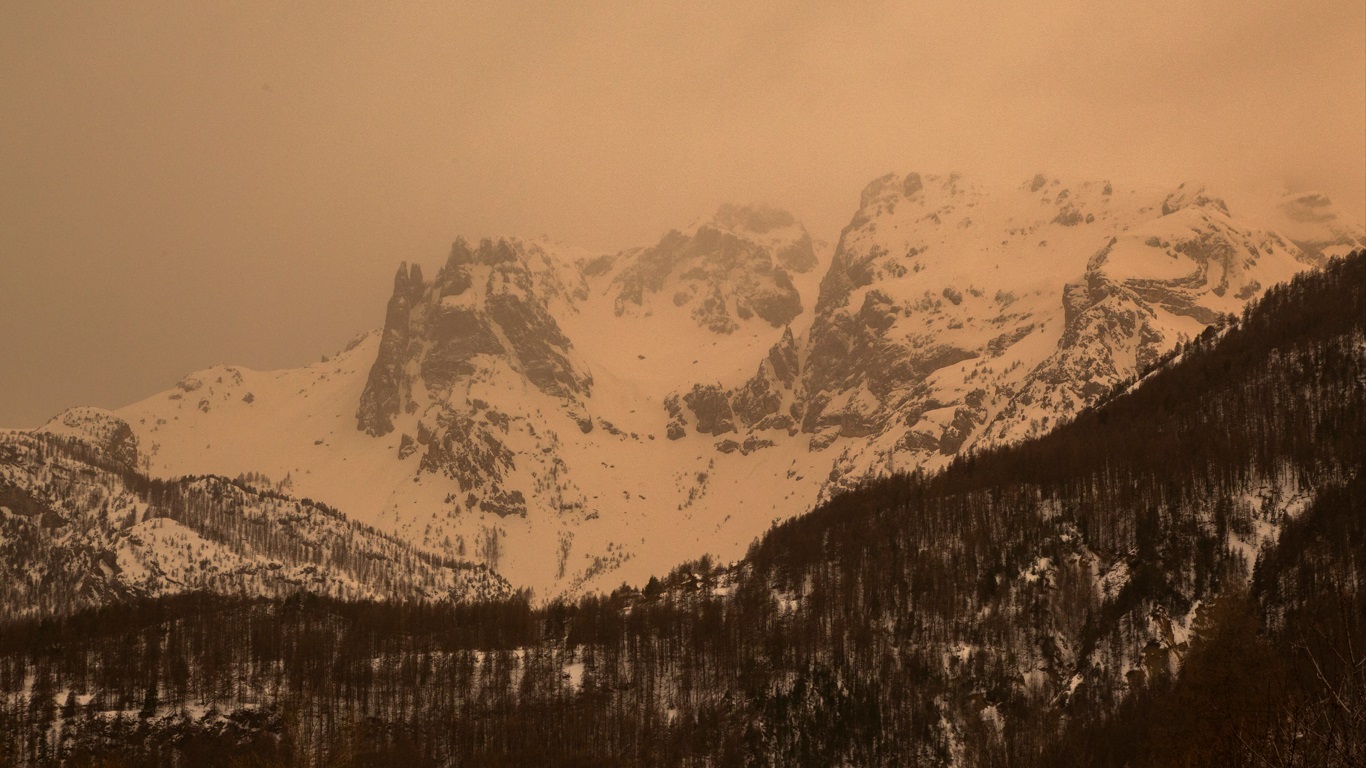

A view of the Alps covered in desert dust in Puy-Saint-André, France. The Sirocco wind is a violent wind coming from the Sahara desert that causes dust to rise from North Africa towards Europe, creating dust deposits on the snow. | Thibaut Durand/Hans Lukas/AFP/Metsul Meteorological
An extremely rare haze of Saharan dust blanketed Switzerland and southeastern France this weekend, prompting public health warnings and staining the sky yellow. The dust turned the snow orange in the Alps. The phenomenon, which began on Friday in Switzerland, brings with it “a very clear deterioration in sunlight and visibility.” Added to this is an increase in fine particle concentrations,” the weather service MeteoSuisse posted on X.
With dust concentrated below 3,000 metres, air quality was particularly affected, with air quality monitoring indicating high levels of particulate matter in the atmosphere. Roman Broglie, a meteorologist at SRF Meteo, said calculations estimate that the amount of dust reached about 180,000 tons, double the levels recorded during recent similar events.
In neighboring France, local authorities in the southeast and south announced that the maximum air pollution limit had been exceeded on Saturday, with the Hérault administration asking residents to avoid intense physical exertion, especially those with heart or respiratory problems.
The cloud of desert dust turned snowy orange in the mountains and in ski resorts in Italy, France and Switzerland, especially in the Alps. Although it is a natural phenomenon that actually occurred, this episode was more severe than the previous ones.
Some parts of #Europe Covered in a rare raised dusty mist #the desert desert.
Dust turned the sky into parts of 🇫🇷 #France 🇨🇭 #Switzerland 🇮🇹 #Italy And the southern 🇩🇪 #Germany Orange color.#Italy #Switzerland #Germany #albie #Alps #Alban #Italian #German #French pic.twitter.com/kvGZHQEB54-Gabriel M. (@Gabriele_M24) March 31, 2024
The view of the atmosphere is detailed in the same place #Alps avec un ciel produces three oranges per poussières de #sable du. du #the desert.
Pra Loup station webcam (04) via @scaping pic.twitter.com/98o9qp18Ej– Meteo60 (@meteo60) March 30, 2024
Good evening everyone,
Saharan dust has turned the ski slopes in Livigno, northern Italy, orange over the past few days.
I think it's better than yellow snow!!Best Regards
Kuwait Dave. pic.twitter.com/Rp3uW5HiGD– Kernow Weather Team (@KWTWeather) March 31, 2024
The Sahara desert emits between 60 and 200 million tons of mineral dust annually. While larger particles quickly return to Earth, smaller particles can travel thousands of kilometres. Winds called Circo transport particles from the Sahara to the European continent.
After last week's incident in the Iberian Peninsula, a new huge wave has emerged #Desert dust The storm swept the skies of the central Mediterranean basin
⬇️ On March 28, it covered 🇮🇹🇲🇹🇬🇷🇱🇾🇹🇳, as we can see in this #TheGuard3 🇪🇺🛰️Photo on the same day pic.twitter.com/ThzYCm2YnO
— Copernicus EU (@CopernicusEU) March 28, 2024
Easter under the yellow sky!
everyone #Italyand part of #EuropeIt is covered by a dense cloud #the desertas shown in #Copernicus #TheGoalkeeper5p March 30 map. #Air quality #happy easter
Tota #Italy sotto heavy belt from the Sahara desert. #meteo @Giulio_Firenzi pic.twitter.com/05I4UG6V1Q– Adam Platform (@PlatformAdam) March 31, 2024
Sand gives snow an orange color and can affect melting processes, particularly in glaciers, which shrink as average temperatures rise, reducing the ice's ability to reflect sunlight. The situation improved in France and Switzerland on Sunday.
MetSul Meteorologia is available on WhatsApp channels. subscription here To access the channel in the messaging app and receive forecasts, alerts and information about the most important weather and climate events in Brazil and around the world, with exclusive data and information from our team of meteorologists.

“Proud explorer. Freelance social media expert. Problem solver. Gamer.”






